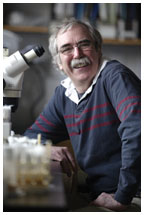
|
March 21, 2007: A moment with...
(Photo by Frank Wojciechowski) |
Eric Wieschaus
How many Nobel laureates devote a sizable portion of their time to teaching introductory science and spend four to six hours a day gazing through microscopes? At least one:
Eric Wieschaus, the Squibb Professor in Molecular Biology, who won the Nobel Prize in Medicine in 1995 for identifying and classifying the genes that control early embryonic development in Drosophila (fruit flies). He recently spoke with PAW’s Brett Tomlinson.
Why does working at a lab bench remain so important to you?
I got into this business because I liked being in the lab. Science is funny because looking at it from the outside, it seems like what’s important are all these big ideas and big advances and writing deep papers that provide answers to complicated issues. That’s true, and that’s fun, and I suppose that’s why society pays us to do it. But to be able to do it well, I think you have to take pleasure in the smaller parts of the doing. Most of the things that you do in the lab actually don’t yield immediate results that are publishable — even when the experiments work. ... Maybe if you are a person with great vision, you can see each of those steps in the context of some bigger whole and be excited about each step. I’m not really like that. What gets me through all the little steps is that I actually like all the little steps.
Does your lab still focus on Drosophila?
Entirely. ... There are people who have been able to change fields frequently or to maintain parallel fields in their labs, [but] most of those people are thinkers rather than doers. They are able to delegate experiments. Because I want to do part of every experiment that comes out of my lab, and because it’s hard to teach old dogs new tricks, I profit a great deal by continuing to use Drosophila.
What are the big questions that you’re trying to answer in embryology?
At this point in history, we know what the genes are that supply the information that says what a cell is supposed to be — am I supposed to be muscle, am I supposed to be brain? ... [There are] two kinds of questions that we want to ask in the lab. On the one hand, how do you convert knowledge into behavior? That is, once you program a cell to be muscle, and it’s still sitting on the surface of an embryo where all the cells look the same, how does it change its shape and move into the place where muscle is supposed to go? That’s one big question.
The other thing, though, is that we think we know what it means when we say a cell is programmed, say, to be muscle or to be skin, but we don’t really know how accurately those choices are made. ... What is the range of cell behaviors? When there are deviations in cell behavior, do they always play out in deviations in final morphology, or are there processes that drive you back to the center, to the single functional path that evolution has selected for this organism?
In what ways can the United States improve its understanding of science?
Science education, K–12, needs to be rethought. If you look at the way science is taught in high school, it has not changed since the turn of the century. ... Science education then influences how we are able to deal with a lot of the social issues that the country is facing. I teach a course, Mol Bio 101, with [Professor] Bonnie Bassler, which is a laboratory course for non-science majors. We feel very strongly that you can’t just teach the social issues of science unless you really teach science. ... You can’t think about the issues — human cloning, genetically modified food, Third-World diseases and parasites, embryonic stem cells, and human individuality and behavior — unless you understand what a gene is, what a protein is, [and] what human variation is. Unless society knows molecular biology, we’re not going to be able to decide these issues in a rational, fair way.
After winning the Nobel Prize, you were adamant that you did not want it to change your life. Have you been successful?
I live my life pretending like I’m not a Nobel laureate. I can putter around my lab, and I can keep my life the same — all of that’s true. But, of course, I only have this privileged existence because I am a Nobel laureate. The power to choose not to have it change your life comes from the power of having received the award. It’s an odd thing.
Is science still fun for you?
Yes. Sometimes it’s hard. Sometimes you’re really tired and you
want to go home, and sometimes you do. ... [But it still has] the restorative
power that it has always had in my life. You can be in a bad mood, but
you go into the lab and do something, and it restores your sense of value
in who you are. And that, I think, will be true forever. ![]()

